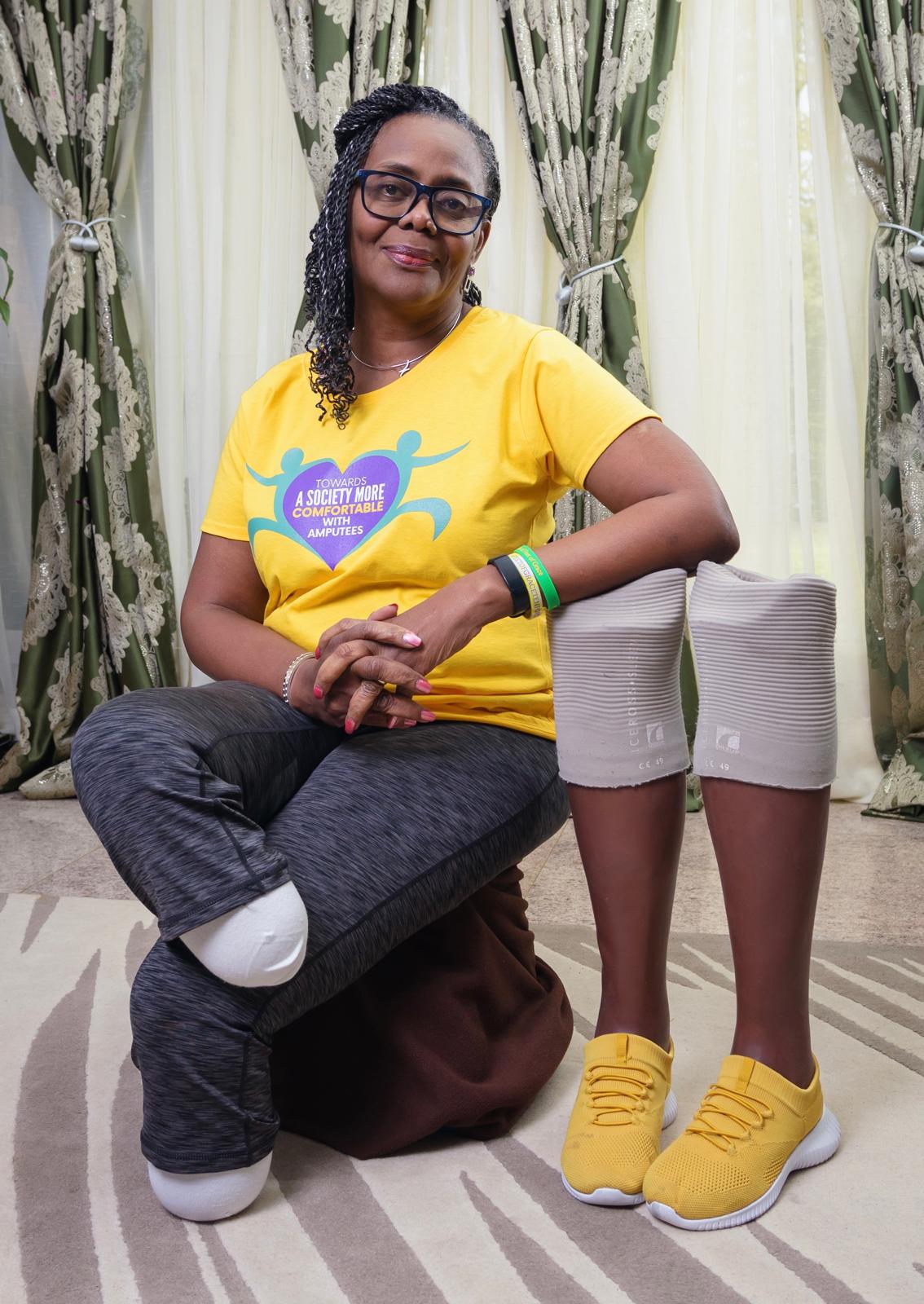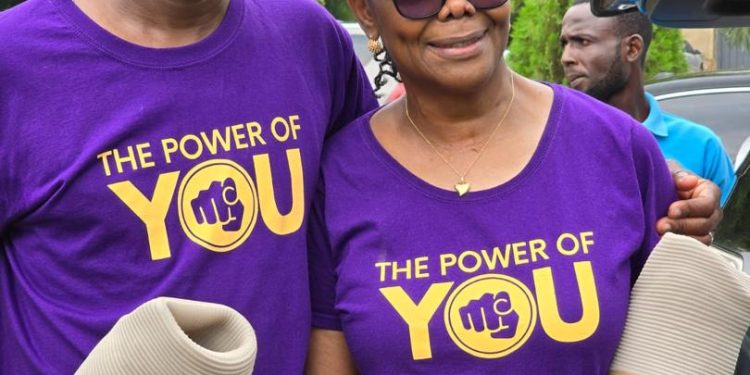Your pain will be in vain if not transformed into a gain for others
Welcome to the 20th issue of the series. Our guest, Dr Irene Titilola Olumese is an epitome of surviving to help others thrive. Dr. Olumese, a trauma informed care specialist and founder of “Feet of Grace Foundation”, is a decorated veteran of the disability struggle. More than twenty years of chronic respiratory disease and a debilitating neuromuscular disorder necessitated a lung transplant surgery. Unfortunately, complications from the surgery left her a double amputee. In it all, she is able to discern meaning and a higher purpose – for herself, and for others.
She ascribes it to the “Grace of God”, and through her foundation “Feet of Grace”, finds an outlet to minister this grace to other amputees. She now makes a mission of using her testimony of God’s grace to spark flames of hope for those facing adversities and challenging life situations. As she finely puts it in a favourite quote that’s central to her philosophy for living:
“Never waste your pain”.
The Annual Charity Walk – So that amputees can stand and walk again!
I met Dr. Olumese during her Foundation’s Annual Charity Walk at Ibadan on Saturday July 27, 2024. The annual Charity walk is a campaign for creating societal awareness and enlightenment centering on amputees. It’s also a strategy for fund raising to support amputees. The Ibadan Charity walk, kicked off from the campus premises of University College Hospital, (UCH) Ibadan after a brief talk by Dr. Olumese. This was followed by a two hour long walk around the UCH environs by placard-carrying participants donning customized purple T-shirts and distributing pamphlets to pedestrians and motorists. Music was played by a band to liven the atmosphere and the press was on ground for live coverage and an interview. The Ibadan charity walk was tagged “The Power of You” – a loud rallying point for Dr Olumese’s unflinching belief in a human potential that disability can not take away.

Giving some insights into the annual charity walk, Dr Olumese said: “We raise funds to provide artificial legs, custom made by prosthetists for beneficiaries, the Foundation facilitates the production”. Artificial legs costs a lot of money – on average, N1,000,000 depending on position of the amputation. Few amputees can afford the costs.
“We are raising funds so those who are compelled to ‘sit down’ in a ‘stand up’ world can have the opportunity to stand and walk again.”
“I see amputees crawling because they can’t afford the cost of prosthetics rehabilitation services, so we give legs to ensure that our beneficiaries can live in their full potentials”, she says.
Her story:
Growing up experiences (Family background)
Irene was born on October 1st in Ibadan. However, she’s a Lagos native and grew up there. The first of seven children in a home that placed premium on the values of discipline, hard work and pursuit of excellence. While growing up, her dad was a Bishop of the Methodist Church and her mother (both now late) was a schoolteacher. “My parents placed a high premium on education, both formal and moral”, She remembers. It was a well grounded childhood and family.
Education and Career
She had her primary education at Ereko Methodist School, Beckley Street, Obalende Lagos. From there, she proceeded to Methodist Girls High School, Yaba, Lagos. This was followed by a brief stint at Federal Government College, Odogbolu, before gaining preliminary admission to the prestigious University of Ibadan. She holds a B.Sc, M.Sc and a Ph.D from the University’s Department of Human Nutrition.
Dr Olumese worked with the United Nations Children’s Fund (UNICEF) for close to fifteen years, and across 3 countries. Although she left UNICEF in 2007 owing to health challenges, she would make a mid-life career switch to stay relevant.
Battle with multiple disabilities
Physical disability came much later in life, however Olumese had since her 20s have to battle significant health challenges – a chronic respiratory and debilitating neuromuscular disease. Narrating the horrors of her health crisis, she said:
“I was on oxygen supplementation for seven years, three of which included non-invasive ventilation. In April 2013, I went for a lung transplant which resulted in complications”.

For five weeks after surgery complications, Olumese was in a medically induced coma. During the period, she suffered insufficient blood supply to her hands and feet. The doctors proposed amputating her hands and legs. Fortunately, her hands made a miraculous recovery, but she wasn’t so lucky with her legs – both of which were amputated below the knees. That was an important moment, for in it the seed of something bigger was born – physical feet were traded for “Feet of Grace”
Crisis in mid-life: Adapting as an amputee
It took a while to accept the new reality of an added disability, one that was so obvious. As Dr Olumese recalls: “losing my legs at mid-life required quite a bit of emotional acceptance and adaptation”.
However, she was determined not to be a victim of her circumstances.
“I worked very hard during my rehabilitation process so I could become independent and regain my autonomy. I did not want to be a burden to my husband and two teenage sons then”.
But it wasn’t easy, and she didn’t do it solo game. She shares from experience that having a supportive family is critical:
“Both my immediate family (husband and children) and my extended family provided incredible support that helped me to adapt to my new phase of life as an amputee. Family support is essential for people who have recently lost their limbs. [This] will go a long way to helping amputees adapt to their new normal”
“Adjusting to my new life as an amputee required that I redefine my new normal and adapt accordingly. I made minimal changes in my home to make it a bit more disability friendly, but I did not want to make a massive change or find myself dependent on others”.
“I fell a few times but learned to get back up again and keep moving forward”.
Discrimination: A subtle Exclusion
When I asked how often she meets with discrimination and her coping mechanism, Dr Olumese’s response implies that discrimination is a relative topic: “I did not suffer any meaningful discrimination”, she says. However, she has the presence of mind to point out that a probable reason she hasn’t experienced direct discrimination is having the privilege of working from home. “[This] makes it a bit easier for me to avoid [direct] acts of discrimination that tend to [be more common] in workplaces and [other public spaces]”, she admits. Still from a more nuanced perspective, this scarred veteran laments the occasional frustrations of not having disability-friendly/accessible facilities in public and private spaces:
“I find it very annoying when I cannot access public facilities like banks, shopping centres and restaurants because there are no ramps or grab bars. It is even more challenging that one cannot find disability-friendly toilets to use in churches, event centres and airports. It is always painful [seeing] the subtle exclusion of people with disabilities in spaces where they have the potential to contribute and make a difference”.
But then she isn’t letting the pain go to waste as she concludes with resolve: “I have devoted myself to advocating for disability inclusion”.
My Disability – a refining Furnace
As I conduct this series of interviews, I make it a point to ask interviewees to share how disability has shaped them into better versions of themselves. Dr Olumese has some neatly pressed views:
Citing her mid-life career change from a nutrition scientist to a certified professional trauma/transformational coach and Trauma Informed Care Specialist, she acknowledges: “I would never have considered this line of career if I had not experienced the challenges that redirected the course of my life”.
She says her medical challenges and subsequent amputation have served to reveal her finest qualities and a stronger version of herself:
“I am more compassionate and sensitive to those going through adversities and significant life challenges. I have also found that I could use my painful experiences to serve a purpose that is higher than me”.
That higher purpose is being realized through the “Feet of Grace” Foundation which provides prosthetic rehabilitation services for amputees who cannot afford the exorbitant costs. The Foundation has provided prosthetic limbs, educational scholarships and seed funds for small businesses – touching close to 200 beneficiaries since its inception in 2015.
Hurting and hilarious sides to Disability
There’s more than enough hurting to a disability and it will be foolhardy not to catch up on its humorous sides
But when I raise the issue of hurting, the amiable trauma coach says she doesn’t really keep a record. Rather she brings some inward flaks to the conversation by calling out people with disabilities acting with a sense of entitlement [and/or] victim mentality. She rues how discouraging it gets when [people with disabilities] keep making demands without wanting to exert themselves to see what they could also bring to the table to help others.
On the lighter side, Olumese say she gets a good kick from the fleeting expressions of consternation she sees on people’s faces when they realise she has two artificial legs. She teases with good humor: “At airports, when they ask me to remove my shoes, I proceed to start removing my legs – laughs”. She adds: “People who see me with my walking stick and immediately start saying ‘sorry’, I just wonder why they think it is okay to feel sorry for me”.
She answers the question of how she sees disability with the words: “I choose to see disability as a springboard I can step on to leap to a higher level of purposeful living”. Then she shares her philosophy for living with disability – “there is a purpose beyond the pain. Everything happens for a reason. What did not kill you must not bury you”.
Addressing PwDs and Society
Dr Olumese tells persons with disabilities that “Disability is a thing of the mind”. [To stay relevant] find your niche and what you are strong and capable of doing. “There is a seed of greatness in you that disability cannot take away from you except you allow it”.
She advocates for an inclusive society that is supportive and comfortable with people with disability. “We need society to see beyond our disability and focus attention on what we can contribute to [its] development and growth. “Each of us has the power to make a difference, irrespective of the degree of ableness”, she reiterates.
The Disability Champions Series, a collaborative project with Madam Joy Bolarin, Executive Director, Jibore Foundation, is anchored by Ogheneruemu Alexander (Disability Issues Blogger). Special acknowledgement to T.O.L.A Foundation for constant back up support.

